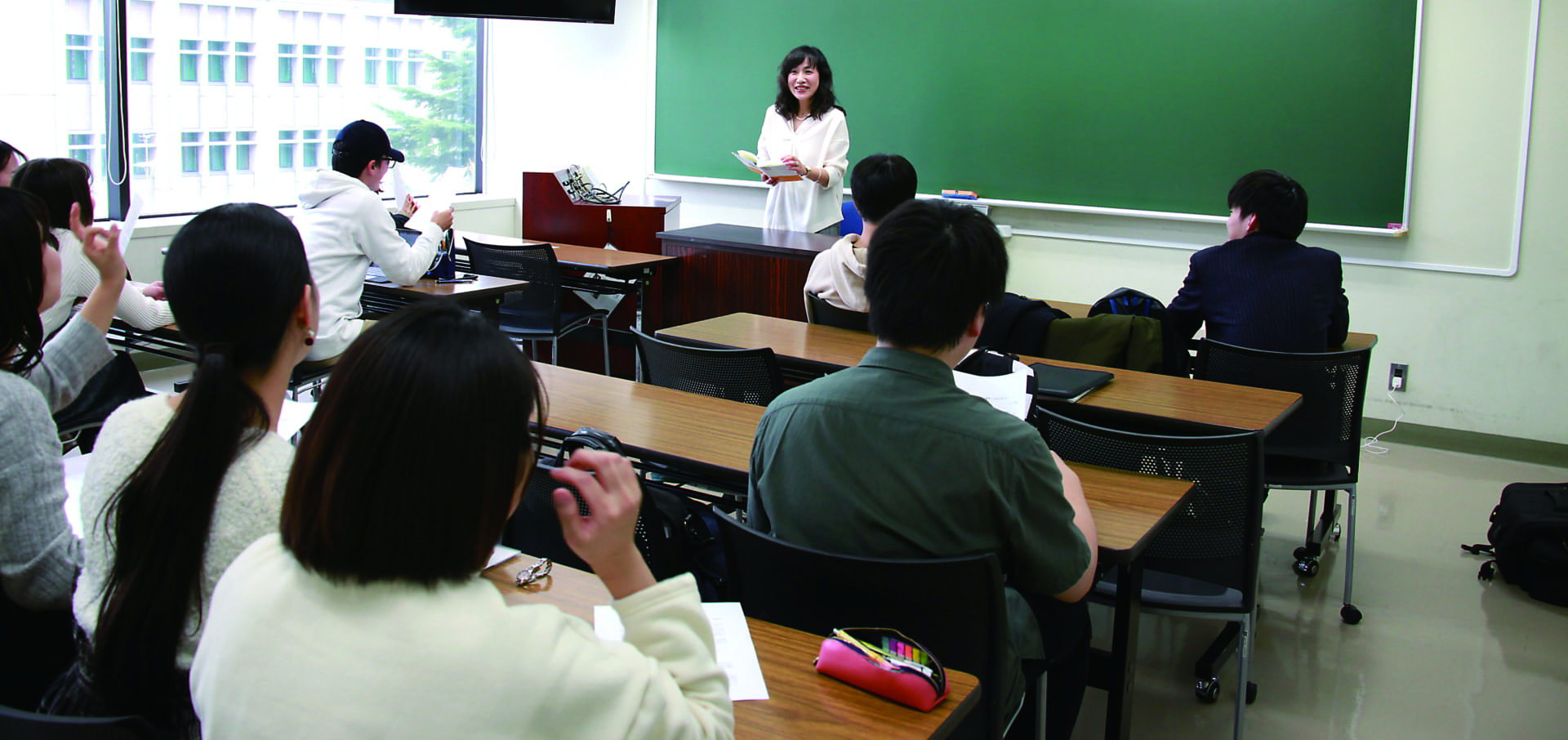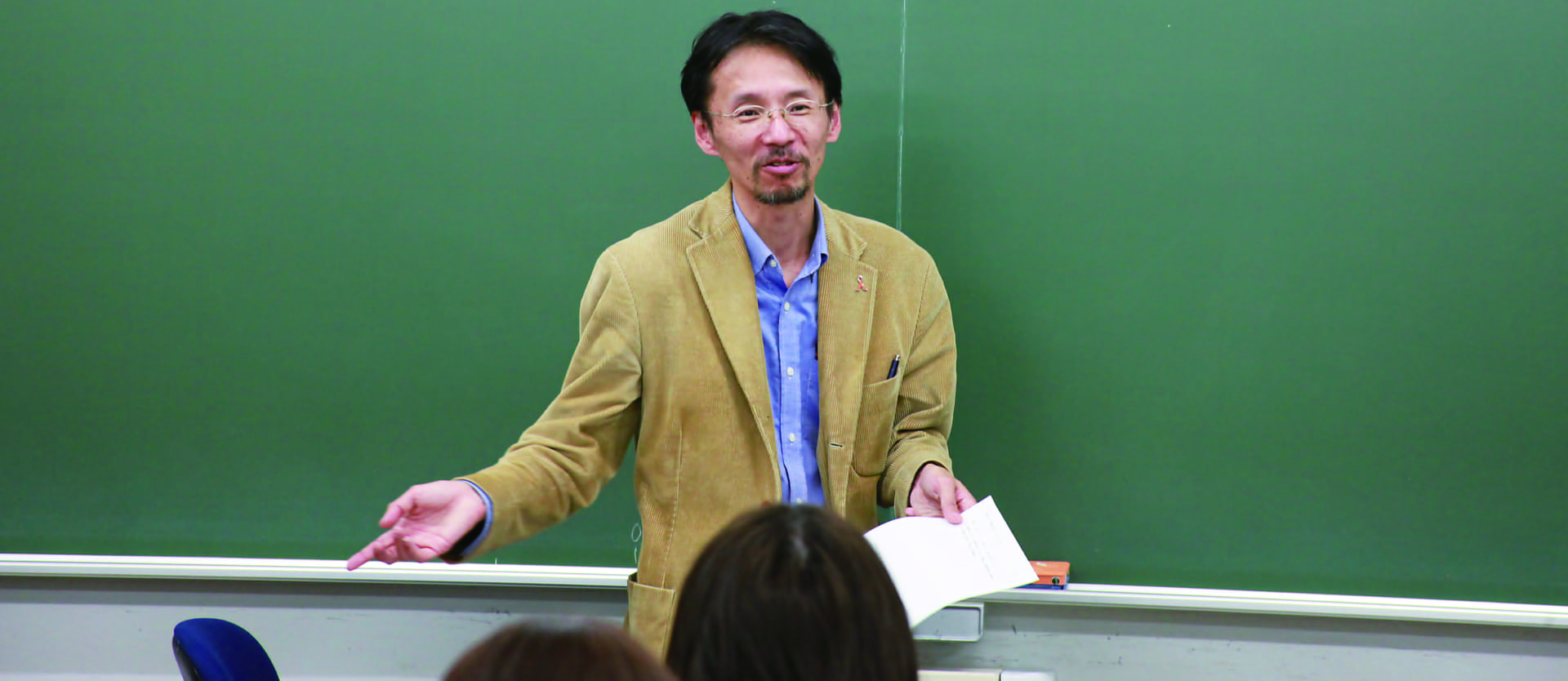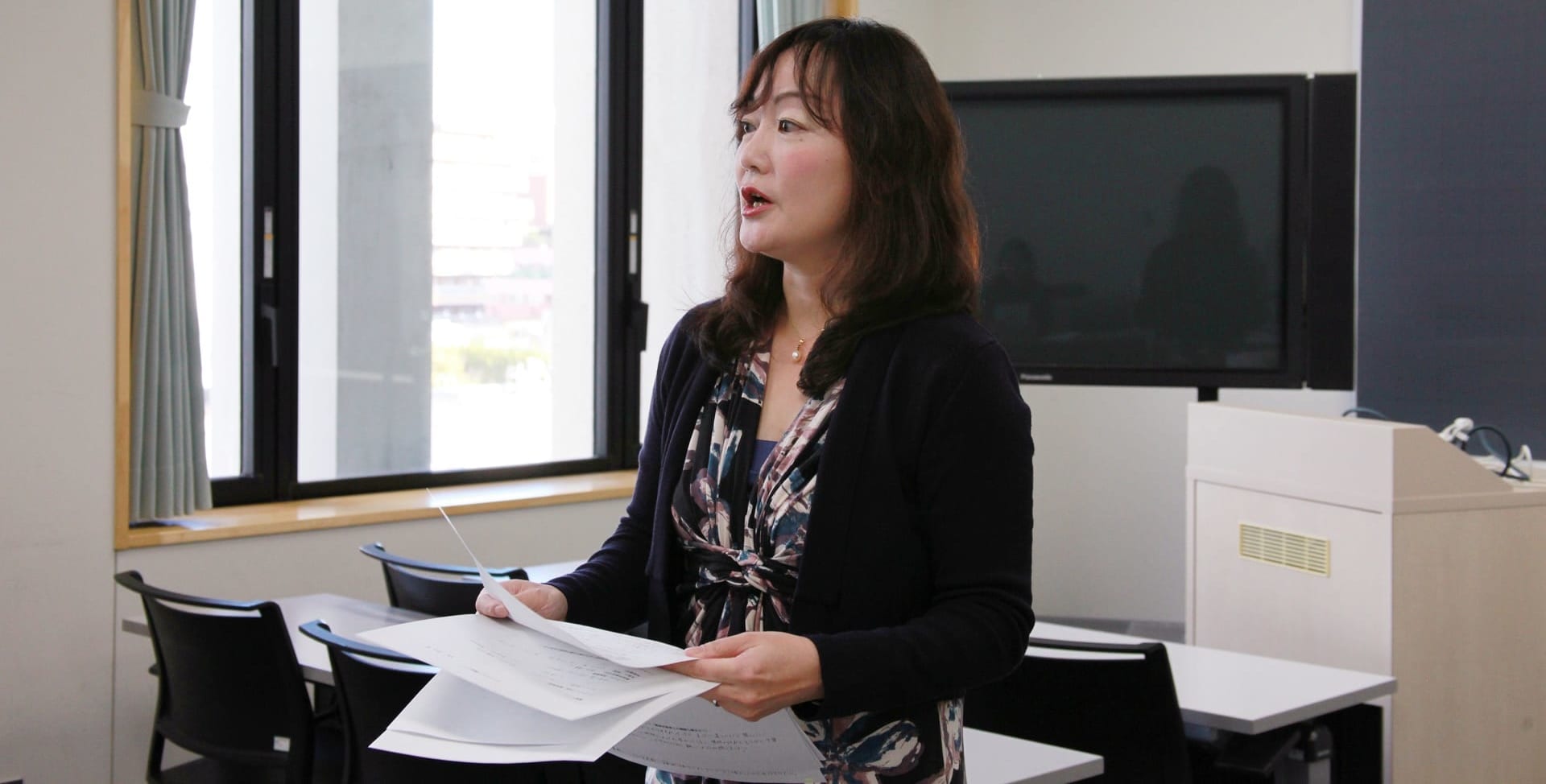- MENU -
PICK UP SEMINARS ゼミナール紹介

教育をめぐる思想や哲学についての研究 北詰 裕子ゼミ
そもそも教育ってなんだろう?という素朴な問いを大切にしながら、それを「学問的な問い」として引き受けつつ、場を共有する人々と対話を重ねて考え続けていきます。とはいえ、教育とは何かという問いは大海のごとき広がりをもつ問いですから、まず私たちがどこで問うているのか、そこからどこに問いは繋がっていくのかを知るための、羅針盤があったらいいなと思います。その羅針盤を、本演習では様々なテクストに求めます。それぞれの時代、文化、社会の中で、教育をめぐる思想はいろいろな人たちによって様々に展開されてきました。そうした人々は、どのような状況の中で、何を問い、何に躓きながら、いかなるものとして教育を捉え、語ろうとしたのでしょうか。まず前期は、教育哲学・教育思想史に関連する書物を受講者全員で検討しながら選定し、それを講読(発表し、話し合い)ます。テクストを読み、各人が考えた事柄や解釈について共有し、率直に語り合うそのプロセスのなかで、受講生は自らの教育観を相対化しつつ、教育哲学や教育思想に関連する諸概念や知識についても学びを深めていきます。後期は、各人のなかで醸成された研究テーマについて個人発表し、全員で議論を重ねながら卒業研究に向けた具体的な問いへの絞り込みと、テーマに即したアプローチの仕方を探究していきます。


主体的に学ぶ姿勢を育む学習の方法・環境・資源を考える 野末 俊比古ゼミ
主体的に学ぶ姿勢を育むために学習の方法・資源・環境をどのようにデザインしていくかについて考えていきます。学習方法には教員による指導も含みます。学習資源・環境とは広い意味での教材・教具だととらえてください。考えるにあたっては、高度情報社会などと呼ばれる現代社会における実践的な側面を重視しています。具体的な研究課題はゼミ生一人一人が選択していきますが、最近は「主体的・対話的で深い学び」(アクティブラーニング)を促進する働きかけや、スマホを含むさまざまなメディアの活用などに関心が集まっていますね。なお、「学習」は学校教育に限りませんので、職場・地域・家庭などを対象とするゼミ生も少なくありません。
前期はグループで、後期は個人で研究を進めていきます。授業時間にはグループ・個人から研究の経過について報告を受け、全員で意見交換(討論)を行います。研究成果は、年度末にゼミ論(論文形式のレポート)にまとめ
ます。ゼミ論は、卒業研究(論文)の基盤となります。なお、関連施設などの見学やゲスト講師による特別講義、ゼミ合宿も実施しています。
他者との対話・協働を通して相互に高め合う──すなわち“学び合い”にゼミの意義はあります。学び合いを通して、現代情報社会における教育の在り方について考えてほしいと願っています。


高校との接続、社会との接続から 考察する大学生・大学教育の調査研究 杉谷 祐美子ゼミ
学生自らが仲間と一緒に考え協力しあい、大学生や大学教育の実態を明らかにする調査を実施し、実際にデータを分析しながら学習者の成長や教育のあり方について考察を深めていきます。入学前の高校教育との関係、また、卒業後従事する職業との関係から、社会に出るまでにどのような力を身につけるべきか、そのための教育や選抜方法はどうあるべきかなど、総合的な視点から教育問題を論じます。日本では、この分野の研究が立ち遅れてきましたが、同世代の過半数が大学・短大へ進学し、今後、経済社会や就業構造の変化が予測されるなか、社会に出る一歩手前の大学教育の重要性は一層高まっています。
ゼミの主役は学生です。履修学生はグループを組み、メンバーで議論を重ねながらアンケート調査やインタビュー調査などの共同研究を進めます。調査では質問内容を工夫し、学生の生の声を収集して、できるだけリアルな大学生・大学教育の実態に迫ることを重視しています。調査方法、分析方法はもちろん、文献の収集・批評、論文作成、発表、議論など、基本的な学習スキルについても習得します。共同研究を通して、将来どのような進路を選ぶにしても必要となるような論理的思考、批判的思考、文章表現、コミュニケーション、チームワークの力などの向上を目指しています。

FACULTY MEMBERS AND SEMINARS 教員・ゼミナール紹介
教育人間科学部 教育学科ではどのような学びが待っているのでしょう。教育学科の教員の紹介と、その授業内容をお伝えします。
教育学科所属
稲垣 中 (イナガキ アタル)
担当科目:
幼児と健康、体育概説(理論)、専門演習I・II、卒業研究I・II
専門分野および関連分野:
薬剤疫学、臨床精神医学、臨床精神薬理学
ゼミナール研究テーマ:
疫学的な考え方を身につける
Message:
本来、疫学とは病気を含めたさまざまな健康問題にどのような要因が影響を与えているかを調査して、対策を立てるための学問なのですが、その考え方は医療のみならず、教育学や社会学を含めたさまざまな分野で応用することができます。社会に出た後に役立つ素養の1つとして、「疫学的な考え方」を学んでみませんか?
井上 直子 (イノウエ ナオコ)
担当科目:
幼児と健康、体育概説(理論)、専門演習I・II、卒業研究I・II
専門分野および関連分野:
スポーツバイオメカニクス、スポーツ生理学、スポーツ科学
ゼミナール研究テーマ:
体力、健康、運動、スポーツおよび体育教育に関する研究
Message:
近年「スポーツの価値」について様々な議論がなされています。人間が生物として存在している限り、身体を動かすことは、必要不可欠です。しかし、「スポーツの価値」はそれだけではありません。「豊かな人生を生きるため」のスポーツのあり方、スポーツとの関わり方、またそれを「体育」の中でどのように教育していくのかを考えます。
岩下 誠 (イワシタ アキラ)
担当科目:
基礎演習Ⅰ・西洋教育史I・II、人間形成学総論、専門演習I・II、卒業研究I・II
専門分野および関連分野:
西洋教育史、イギリス教育史・アイルランド教育史
ゼミナール研究テーマ:
20世紀教育史を考える
Message:
「西洋」における「過去」の教育のあり様を研究する西洋教育史は、教育学のなかでも「今・ここ」の問題から最も距離を取ることができる技法のひとつです。教育に関してベタベタした思い入れはないが、しかし何か気になる(気に障る、でも大丈夫です)、という少し偏屈な人に向いている学問分野かもしれません。
大森 秀子 (オオモリ ヒデコ)
担当科目:
基礎演習I、宗教教育学、西洋教育史III、応用演習II、専門演習I・II、卒業研究I・II
専門分野および関連分野:
アメリカ教育史、キリスト教教育史
ゼミナール研究テーマ:
シティズンシップから考える教育と社会
Message:
多様な人種・民族・言語・宗教から成るアメリカの歴史の中に、教育によるアメリカ化の幾つかの諸相があります。移民を多く受け入れてきたアメリカの「包摂」と「排除」の歴史事象を学ぶことは、アメリカ的価値観への探求と共に、国民意識の形成や多文化社会の理想と現実にアプローチする視点を得ることになるでしょう。
小木曽 一之 (オギソ カズユキ)
担当科目:
体育概説(理論)、体育理論(運動)、初等教科教育法(体育科)、応用演習II、専門演習I・II、卒業研究I・II
専門分野および関連分野:
応用生理、運動制御、体育科教育
ゼミナール研究テーマ:
内外の環境変化に対する身体諸機能の変化をもとに身体運動について考える
Message:
人間は機械ではありません。全てのことを正確にはできません。でも柔軟に対応し、解決することはできます。スポーツや体育授業も同じです。身体の仕組みを理解しながら、「どうすれば上手くできるのか」を楽しみながら追求します。それは我々が将来にわたって心身ともに健康で生き生きと暮らしていくためのヒントです。
北澤 武(キタザワ タケシ)
担当科目:
教育学概説、学校教育学総論、情報通信技術の活用と教育方法(初等)、専門演習I・II、応用演習II、卒業研究I・II
専門分野および関連分野:
教育工学、科学教育、情報教育
ゼミナール研究テーマ:
情報通信技術(ICT)を活用した教育に関する研究
Message:
子供が学習のために情報通信技術(ICT)を道具として上手に活用することで、子供の興味・関心や可能性を引き出すことができます。また、教師がコンピュータに蓄積された子供の学習履歴を分析することで、子供に対する理解を深め、今後の指導に活かすことが期待されます。ICTを活用した教育について、ぜひ一緒に考えていきましょう。
北詰 裕子 (キタヅメ ユウコ)
担当科目:
教育思想概説、教育哲学A・B、応用演習I、専門演習I・II、卒業研究I・II
専門分野および関連分野:
教育哲学、教育思想史
ゼミナール研究テーマ:
教育をめぐる思想や哲学についての研究
Message:
教育哲学は、〈教育〉という言菓で表現されているのは一体何かを深く追求する学問です。教育思想史は、そうした〈教育〉という言葉で表現されることがらが、どのような文脈において成立しうるのかを明らかにする学問です。さまざまなテクストに導かれながら、一緒に〈教育〉とは何かについて、考えてみませんか。
久保寺 節子(クボテラ セツコ)
担当科目:
幼児とことば、保育方法研究A・B、保育内容教育法(人間関係)、保育内容教育法(ことば)
専門分野および関連分野:
幼児教育学
Message:
「保育の見える化」が話題になっています。私たち大人が、子どもの姿をおもしろがって見ること、丁寧に子どもの声を聴くことで、たくさんの発見があります。そのような子どもの姿が見えるようになっていくことが「保育の見える化」につながります。ご一緒に子どもの世界を感じ、味わっていきましょう。
小針 誠 (コバリ マコト)
担当科目:
教育社会学総論、教育学概説、比較発達社会学、家庭教育A、生活科概説、応用演習II、専門演習I・II、卒業研究I・II
専門分野および関連分野:
教育社会学、教育社会史
ゼミナール研究テーマ:
教育社会学 〜わたしの謎を社会の問題として読く・解く・説く〜
Message:
「なぜ」学力は家庭環境によって格差が生じるのだろう?「なぜ」学校でアクティブラーニングが導入されようとしているのだろう?そもそも「なぜ」学校に行って勉強するのだろう?教育社会学は教育に関わる素朴な「なぜ」を社会学の視点と方法から解明し、教育や社会の未来予想図をデザインすることにあります。
米田 英嗣 (コメダ ヒデツグ)
担当科目:
教育心理学概説、教材開発論、基礎演習Ⅰ、専門演習I・II、卒業研究I・II
専門分野および関連分野:
教育心理学、教育神経科学、物語理解
ゼミナール研究テーマ:
読解に関連した教育心理学研究
Message:
教育心理学は、人間がどのように理解し、学習していくのかを解明する学問です。物語を理解することは、物語で起こったことを仮想的に体験することであると考えられます。物語理解を通じて様々な経験を積むことができれば、現実に存在している人の気持ちをよく理解できるようになり、共感性や社会性を高めることができるかもしれません。
杉谷 祐美子 (スギタニ ユミコ)
担当科目:
基礎演習I、高等教育論A・B、青年文化論、専門演習I・II、卒業研究I・II
専門分野および関連分野:
高等教育研究、教育社会学、大学生・大学教育に関する研究
ゼミナール研究テーマ:
高校との接続、社会との接続から考察する大学生・大学教育の調査研究
Message:
大学を中心とした高等教育(高校卒業後の教育)の研究は新しい分野で、専門的に学べる大学はわずかです。社会と密接に関わり、政策の動きも早く、そのようななか、大学生の意識や行動の傾向、その要因、大学の仕組みなどを明らかにし、大学教育や大学入試がどうあるべきか考えます。特に大学生には、最も身近な問題に感じられるでしょう。
杉本 卓 (スギモト タク)
担当科目:
教育情報学総論、メディア・コミュニケーション総論、情報通信技術の活用と教育方法(初等)、専門演習I・II、卒業研究I・II
専門分野および関連分野:
情報教育、情報社会論
ゼミナール研究テーマ:
学び、コミュニケーション、メディア
Message:
情報メディアは、教育の中でも、社会においても、大切な役割を果たしています。よりよい教育のあり方を考える上で、「情報」「メディア」という切り口はますます重要になっています。また、社会生活の中での情報メディアの働きを考えることで、他者との関わりや私たちの考え方・生き方について理解を深めることができます。
高櫻 綾子 (タカザクラ アヤコ)
担当科目:
教育心理学概説、臨床教育学総論、幼児と人間関係、臨床保育学A・B、応用演習I、専門演習I・II、卒業研究I・II
専門分野および関連分野:
幼児教育学・保育学
ゼミナール研究テーマ:
生涯にわたる発達のなかで幼児教育・保育を問う
Message:
乳幼児期の教育・保育には生涯にわたる幸せを掴むヒントがあります。幼児教育学・保育学は人生の中でも教育効果が高い乳幼児期の子どもの育ちについて理論と実践の両面から多角的に追究します。子どもについて学ぶことを通して自らの育ちを振り返り、将来の自分や社会を思い描いてみませんか?
田邉 泰(タナベ ヤスシ)
担当科目:
国語科教育法A・B、国語科教材論A・B、初等国語概説、中等国語概説
専門分野および関連分野:
国語科教育
Message:
国語科は、「中核的な教科」として、学習の基盤となる言語能力を育成していかなければなりません。具体的には、文字をはじめ、人の話を聞き取る力、文章を読み解く力、文章を書く力、話す力などを育成することが求められています。より良い授業を目指して、教材研究や指導技術等について、一緒に学んでいきましょう。
月岡 正明 (ツキオカ マサアキ)
担当科目:
幼児と人間関係、初等教科教育法(社会科)、社会科概説、生活科概説、教職論(中等)、教職実践演習(中・高)
専門分野および関連分野:
社会科教育、学校経営
Message:
自分たちの生きている社会が、様々な人たちの思いや願い、働きなどによって支えられていることを問題解決的に学び、よりよい社会の実現のために自分たちは何をすべきか考える教科が社会科です。知識の習得だけでなく、情報を収集し取捨選択する技能、多角的に考え判断し、表現する力も重要です。社会科の醍醐味をともに学んでいきましょう。
庭井 史絵 (ニワイ フミエ)
担当科目:
図書館システムサービス論、学校経営と学校図書館 、学習指導と学校図書、教育学特論K、図書館情報学実習B、応用演習I、専門演習I・II、卒業研究I・II
専門分野および関連分野:
図書館情報学(学校図書館)
ゼミナール研究テーマ:
学びにつながる「読書」と「情報利用」のための場つくり
Message:
すべての小学校・中学校・高等学校に「図書室」があり、子どもたちにとって最も身近な図書館です。学校図書館が、心地よい読書の場として、探究を深める場として、また、情報リテラシーを育む場として、学校教育に不可欠な存在になるように、人・メディア・場の研究がすすめられています。
野末 俊比古 (ノズエ トシヒコ)
担当科目:
図書館情報学概論、教育学特論J、図書館情報学実習A、教育方法論(初等)、情報通信技術の活用と教育方法(初等)、応用演習II、専門演習I・II、卒業研究I・II
専門分野および関連分野:
教育情報学、図書館情報学、教育資源論
ゼミナール研究テーマ:
主体的に学ぶ姿勢を育む学習方法・環境・資源 ―現代情報社会における教育の在り方―
Message:
教育・学習の方法、資源(教材)、環境などについて、主に情報やメディアなどの観点から考えます。いわゆるICTのイメージがあるかもしれませんが、例えば、本を読んで考える行為は、活字メディアを使って情報を入手・分析しているととらえられます。「学び」を俯瞰的にみることで、よりよい教育・学習のヒントを得ることができます。
長谷川 祥子 (ハセガワ サチコ)
担当科目:
初等国語概説、中等国語概説、初等教科教育法(国語科)、応用演習II、専門演習I・II、卒業研究I・II
専門分野および関連分野:
国語科教育学
ゼミナール研究テーマ:
授業開発・教材開発に関する研究、教科教育・国語教育に関する研究
Message:
国語科教育学では、小学校・中学校・高等学校の国語科の授業づくりを中心にして、言葉の力を育てる方法を考えています。物語や小説、説明的な文章を読む学習や、自分の考えを書く学習、分かりやすく話す学習などについて、その背景や理論、実際の授業のあり方を探っていきます。
早坂 方志 (ハヤサカ マサシ)
担当科目:
障害児・者の心理I・II、特別支援教育A・B・C、教育学特論G、応用演習II、専門演習I・II、卒業研究I・II
専門分野および関連分野:
特別支援教育、教育心理学
ゼミナール研究テーマ:
特別支援教育とその関連分野に関する研究の基礎
Message:
障害などにより、通常の教育に加えて特別な対応が必要な子どもたちの教育は、特別支援教育とよばれています。また、障害のある子どもとない子どもが共に学ぶ仕組みであるインクルーシブ教育が進展しています。近年、これらについて知ることは、教育に携わる専門職に必要な素養となっています。大学の授業では、障害のある子どもの教育やインクルージョンについて、それらの理念・歴史、制度、教育内容・方法など、多様な視点から学び、望ましい教育の在り方について、筋道立てて考えることができるようになります。
平賀 伸夫 (ヒラガ ノブオ)
担当科目:
幼児と環境、理科概説A、初等教科教育法(理科)、応用演習II、専門演習I・II、卒業研究I・II
専門分野および関連分野:
理科教育、授業研究
ゼミナール研究テーマ:
理科を中心とした教育実践研究 -授業研究・教材開発・新しい授業の創造-
Message:
理科は自然の不思議さ、理解することの楽しさを子どもに伝える教科です。理科教育は、伝え方の習得、向上をめざします。そのために、理科の知識・技能、子どもの実態、教育理論を学びます。授業を立案し、実践し、分析する力も身につけます。受ける側からみてきた理科授業を、行う側からみるわけです。新たな視界を楽しみましょう。
福元 真由美(フクモト マユミ)
担当科目:
教育学研究法、幼児と環境、幼児教育原理A・B、保育内容教育法(環境)、応用演習Ⅰ、専門演習I・II、卒業研究I・II
専門分野および関連分野:
幼児教育学、保育学
ゼミナール研究テーマ:
保育と子育てを物語ること -歴史・実践・メディア-
Message:
日本の教育の歴史をふり返ってみると、現代ほど保育と子育てが注目され、議論されている時代はありません。乳幼児期の子どもの育ちと学びについて多様な角度から問いを立て、検討する学問を保育学といいます。保育学を学ぶことを通して、私たちはどのように社会に参加していけばいいのか共に考えていきましょう。
古荘 純一(フルショウ ジュンイチ)
担当科目:
基礎演習Ⅰ、小児精神神経学、小児保健論、保育内容教育法(健康)、教育学特論F・M、専門演習I・II、卒業研究I・II
専門分野および関連分野:
小児科学、小児神経医学、小児精神神経学、児童青年精神神経学、てんかん学
ゼミナール研究テーマ:
子どもの自尊心をふまえた、小児保健・精神保健の理解と対応
Message:
コンサルテーション、リエゾンという概念があります。ひとりひとりの子どものニーズに応えるために、「相談」し「連携」できる体制を整えておくことです。科学的な検証や事例検討を行いながら、ひとりで問題を抱えこまず、かつ簡単に他人に委ねない姿勢を身に付けていきましょう。
益川 弘如(マスカワ ヒロユキ)
担当科目:
教育学研究法、認知科学概論、インターフェース論、情報通信技術の活用と教育方法(中等)、応用演習Ⅰ、専門演習I・II、卒業研究I・II
専門分野および関連分野:
認知科学、学習科学、教育工学
ゼミナール研究テーマ:
人の学びの過程を解明する研究と、子供たちの学びを引き出す学習環境・評価の研究
Message:
人の学びは多様で、人によってわかり方や考え方が異なります。だからこそ、他者との対話を通して学びを深めていくことが促進される学習環境をデザインすることが教育の場で大切となってきます。この問題を解決してくために、大学研究室と実践現場とを行き来しながら、一緒に考えていきましょう。
柳田 雅明(ヤナギダ マサアキ)
担当科目:
生涯学習概論I・II、比較教育学、教育学概説、応用演習Ⅱ、専門演習I・II、卒業研究I・II
専門分野および関連分野:
生涯学習論、比較教育学、カリキュラム研究、職能形成学、社会教育学、地域教育
ゼミナール研究テーマ:
様々な組織・機関によるもしくはそれらが連携・融合して展開していく学び
Message:
人が学んでいる場は、学校だけではありません。学びは社会とつながっています。そして学校以外でも学びがあります。そのように学校と社会とがつながりさらに学校も飛び越えて、大人の学び手も含め教え育み学ぶことを、以上で示した専門分野は探求します。そこでは、広い視野から学んで問うことすなわち学問ができます。
山下 暁子(ヤマシタ キヨウコ)
担当科目:
幼児と表現B、応用演習Ⅱ、図画工作概説(造形)、図画工作概説(美術)、初等教科教育法(図画工作科)、専門演習I・II、卒業研究I・II
専門分野および関連分野:
美術教育
ゼミナール研究テーマ:
美術と教育
Message:
いろいろなことを感じること、見つけること、楽しむこと、そして表現していくこと。それは子どもたちだけでなく、私たち人間が生きて行くための基本的なことでもあります。学校での図工・美術といった教科のみならず、教科の枠を超えた美術教育も視野に入れ、広く美術と教育について学び合う場をつくっていきましょう。
山本 珠美(ヤマモト タマミ)
担当科目:
生涯学習支援論II、社会教育経営論I・II、社会教育実習、社会教育実践研究、教育制度概説、専門演習I・II、卒業研究I・II
専門分野および関連分野:
生涯学習論、社会教育学
ゼミナール研究テーマ:
教育分野における市民参加の研究 ~政策決定から地域活動への参加まで~
Message:
若いみなさんにとっては、学びの場として学校はとても大きな存在でしょう。しかし、「人生100年時代」と言われる昨今、生涯というスパンで見ると、学校で学ぶ時間は限られています。人は生まれてから死ぬまで学び続ける生き物です。生涯続く学びを支援するにはどのようなシステムが望ましいか、一緒に考えましょう。
山本 美紀(ヤマモト ミキ)
担当科目:
幼児と表現A、初等教科教育法(音楽科)、音楽概説(理論)、音楽概説(器楽A)、保育内容教育法(表現A)、専門演習I・II、卒業研究I・II
専門分野および関連分野:
音楽学、音楽教育学、キリスト教と音楽文化、教会音楽
ゼミナール研究テーマ:
社会の様々な事象や課題を、芸術文化と教育の視点から問い直し、研究する
Message:
音楽は言葉と同様に、コミュニケーションのツールです。人間は、胎内での母親の心音に始まって、様々な音を通して世界と関わり、理解してきました。幼児・児童期の音や音楽に関わる経験は、生涯に渡る自他との音楽を通した主体的関わりの基盤となります。豊かなコミュニケーション構築と支援をめざし、創造的に学んでいきましょう。
吉田 映子(ヨシダ エイコ)
担当科目:
初等教科教育法(算数科)、算数概説A、教職論(初等)
専門分野および関連分野:
算数教育
Message:
算数はどうしてやらないといけないの?それは考えることが当たり前になるためです。「なぜ?どうして?」「やってみたい!」と思って試行錯誤しながら取り組んで「そうか!」と納得。そんな「?」(はてな)と「!」(なるほど)のある算数の授業作りを考えていきましょう。
髙澤 有以子(タカザワ アイコ)
担当科目:
教育情報学総論、教育学特論I、青山スタンダード(英語講義)
専門分野および関連分野:
情報学、情報探索、情報教育
Message:
情報メディア・情報通信技術と共に、私たちの情報の探し方や活用の仕方は変化し続けています。その過程で生じる不確かさや曖昧さは、教育を考える際にも、日々の営みや社会の在り方を理解する上でも重要な要素です。「よくわからない」 からこそ生まれる問いと、それに向き合うことで見えてくる情報、人、社会のつながり。こうした情報学の視点から、学びとは何かを共に考えていきましょう。
SEMINAR LIST ゼミナール研究テーマ一覧
教育学科のゼミナールの研究テーマを紹介いたします。
(担当教員・科目内容は年度によって異なる場合があります。)
| 教員名 | ゼミナール研究テーマ(クリックすると教員情報へリンクします) |
|---|---|
|
稲垣 中
|
疫学的な考え方を身につける

|
|
井上 直子
|
体力、健康、運動、スポーツおよび体育教育に関する研究

|
|
岩下 誠
|
20世紀教育史を考える

|
|
大森 秀子
|
シティズンシップから考える教育と社会

|
|
小木曽 一之
|
内外の環境変化に対する身体諸機能の変化をもとに身体運動について考える

|
|
北澤 武
|
情報通信技術(ICT)を活用した教育に関する研究

|
|
北詰 裕子
|
教育をめぐる思想や哲学についての研究

|
|
小針 誠
|
教育社会学 〜わたしの謎を社会の問題として読く・解く・説く〜

|
|
米田 英嗣
|
読解に関連した教育心理学研究

|
|
杉谷 祐美子
|
高校との接続、社会との接続から考察する大学生・大学教育の調査研究

|
|
杉本 卓
|
学び、コミュニケーション、メディア

|
|
高櫻 綾子
|
生涯にわたる発達のなかで幼児教育・保育を問う

|
|
庭井 史絵
|
学びにつながる「読書」と「情報利用」のための場つくり

|
|
野末 俊比古
|
主体的に学ぶ姿勢を育む学習方法・環境・資源 ―現代情報社会における教育の在り方―

|
|
長谷川 祥子
|
授業開発・教材開発に関する研究、教科教育・国語教育に関する研究

|
|
早坂 方志
|
特別支援教育とその関連分野に関する研究の基礎

|
|
平賀 伸夫
|
理科を中心とした教育実践研究 -授業研究・教材開発・新しい授業の創造-

|
|
福元 真由美
|
保育と子育てを物語ること -歴史・実践・メディア-

|
|
古荘 純一
|
子どもの自尊心をふまえた、小児保健・精神保健の理解と対応

|
|
益川 弘如
|
人の学びの過程を解明する研究と、子供たちの学びを引き出す学習環境・評価の研究

|
|
柳田 雅明
|
様々な組織・機関によるもしくはそれらが連携・融合して展開していく学び

|
|
山下 暁子
|
美術と教育

|
|
山本 珠美
|
教育分野における市民参加の研究 ~政策決定から地域活動への参加まで~

|
|
山本 美紀
|
社会の様々な事象や課題を、芸術文化と教育の視点から問い直し、研究する

|
RESEARCH THEMES 学生の研究テーマ例
-
 小学校におけるストレスマネジメント教育
小学校におけるストレスマネジメント教育 -
 部活動におけるチーム運営とそれに伴った集団意識の明確化
部活動におけるチーム運営とそれに伴った集団意識の明確化 -
 外国人児童生徒の現状と課題
外国人児童生徒の現状と課題 -
 受動的電気刺激トレーニングは筋機能の向上を導くか
受動的電気刺激トレーニングは筋機能の向上を導くか -
 フレーベルの子ども観及び幼児教育に関する一考察
フレーベルの子ども観及び幼児教育に関する一考察 -
 都市部と町村部間における学力格差の実態とその要因
都市部と町村部間における学力格差の実態とその要因 -
 自閉スペクトラム症児の善悪判断における共感性
自閉スペクトラム症児の善悪判断における共感性 -
 青年期のアイデンティティ形成に影響を及ぼす危機経験とはなにか
青年期のアイデンティティ形成に影響を及ぼす危機経験とはなにか -
 Instagramにおける行動と承認欲求との関連性
Instagramにおける行動と承認欲求との関連性 -
 からだメタ認知によるスキル熟達の効果
からだメタ認知によるスキル熟達の効果 -
 幼児は「砂場」でどのように出会い、関わり、関係を築くのか
幼児は「砂場」でどのように出会い、関わり、関係を築くのか -
 読書と人の生き方・考え方との関係
読書と人の生き方・考え方との関係 -
 ICTが実現する「個別最適な学び」
ICTが実現する「個別最適な学び」 -
 家庭、学校が子供の自己肯定感向上のためにできることとは
家庭、学校が子供の自己肯定感向上のためにできることとは -
 博学連携学習におけるバーチャルミュージアムの活用事例の提案
博学連携学習におけるバーチャルミュージアムの活用事例の提案 -
 女児向けアニメにおけるジェンダー描写の変化
女児向けアニメにおけるジェンダー描写の変化 -
 特別支援教育における子供の自己肯定感を育む環境づくり
特別支援教育における子供の自己肯定感を育む環境づくり -
 大学キャリア教育が抱える問題
大学キャリア教育が抱える問題 -
 魅力的な遊び場としての公園の在り方
魅力的な遊び場としての公園の在り方 -
 音楽の教科書にポピュラー音楽が掲載される意義
音楽の教科書にポピュラー音楽が掲載される意義 -
 教育現場における映画コンテンツの研究
教育現場における映画コンテンツの研究